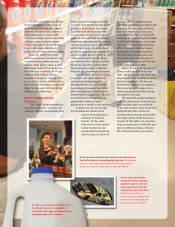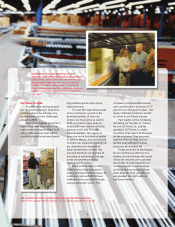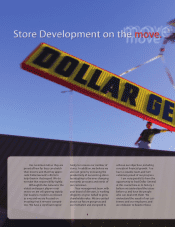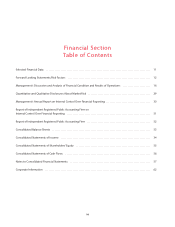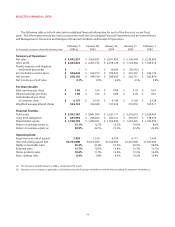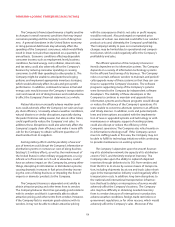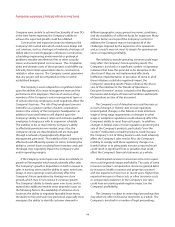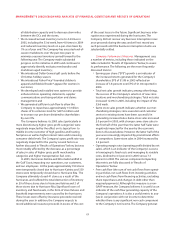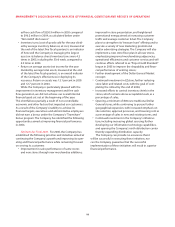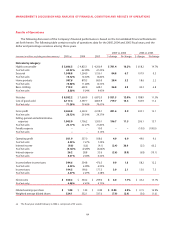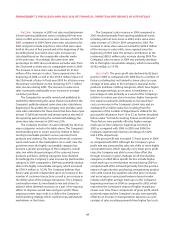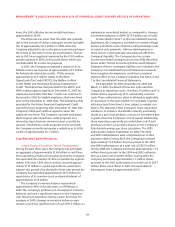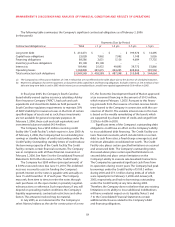Dollar General 2005 Annual Report Download - page 17
Download and view the complete annual report
Please find page 17 of the 2005 Dollar General annual report below. You can navigate through the pages in the report by either clicking on the pages listed below, or by using the keyword search tool below to find specific information within the annual report.
13
FORWARD-LOOKING STATEMENTS/RISK FACTORS
The Company’s financial performance is highly sensitive
to changes in overall economic conditions that may impact
consumer spending and the Company’s costs of doing busi-
ness. A general slowdown in the United States economy
or rising personal debt levels may adversely affect the
spending of the Company’s consumers, which would likely
result in lower net sales than expected on a quarterly or
annual basis. Economic conditions affecting disposable
consumer income, such as employment levels, business
conditions, fuel and energy costs, inflation, interest rates,
and tax rates, could also adversely affect the Company’s
business by reducing consumer spending or causing
consumers to shift their spending to other products. The
Company might be unable to anticipate these buying
patterns and implement appropriate inventory strategies,
which would adversely affect its sales and gross profit
performance. In addition, continued increases in fuel and
energy costs would increase the Company’s transportation
costs and overall cost of doing business and could adverse-
ly affect the Company’s financial statements as a whole.
Natural disasters or unusually adverse weather condi-
tions could adversely affect the Company’s net sales and sup-
ply chain efficiency. Unusually adverse weather conditions,
natural disasters or similar disruptions, especially during
the peak Christmas selling season, but also at other times,
could significantly reduce the Company’s net sales. In
addition, these disruptions could also adversely affect the
Company’s supply chain efficiency and make it more diffi-
cult for the Company to obtain sufficient quantities of
merchandise from its suppliers.
Existing military efforts and the possibility of war and
acts of terrorism could disrupt the Company’s information or
distribution systems or increase our costs of doing business.
Existing U.S. military efforts, as well as the involvement of
the United States in other military engagements, or a sig-
nificant act of terrorism on U.S. soil or elsewhere, could
have an adverse impact on the Company by, among other
things, disrupting its information or distribution systems;
causing dramatic increases in fuel prices thereby increas-
ing the costs of doing business; or impeding the flow of
imports or domestic products to the Company.
The Company’s business is dependent on its ability to
obtain attractive pricing and other terms from its vendors.
The Company believes that it has generally good relations
with its vendors and that it is generally able to obtain
attractive pricing and other terms from vendors. However,
if the Company fails to maintain good relations with its
vendors, it may not be able to obtain attractive pricing
with the consequence that its net sales or profit margins
would be reduced. Also, prolonged or repeated price
increases of certain raw materials could affect our vendors’
product costs and, ultimately, the Company’s profitability.
The Company’s ability to pass on incremental pricing
changes may be limited due to operational and competi-
tive factors, which could negatively affect the Company’s
profitability and sales.
The efficient operation of the Company’s business is
heavily dependent on its information systems. The Company
depends on a variety of information technology systems
for the efficient functioning of its business. The Company
relies on certain software vendors to maintain and periodi-
cally upgrade many of these systems so that they can con-
tinue to support the Company’s business. The software
programs supporting many of the Company’s systems
were licensed to the Company by independent software
developers. The inability of these developers or the
Company to continue to maintain and upgrade these
information systems and software programs would disrupt
or reduce the efficiency of the Company’s operations if it
were unable to convert to alternate systems in an efficient
and timely manner.In addition, costs and potential prob-
lems and interruptions associated with the implementa-
tion of new or upgraded systems and technology or with
maintenance or adequate support of existing systems
could also disrupt or reduce the efficiency of the
Company’s operations. The Company also relies heavily on
its information technology staff. If the Company cannot
meet its staffing needs in this area, the Company may not
be able to fulfill its technology initiatives while continuing
to provide maintenance on existing systems.
The Company is dependent upon the smooth function-
ing of its distribution network, the capacity of its distribution
centers (“DCs”), and the timely receipt of inventory. The
Company relies upon the ability to replenish depleted
inventory through deliveries to its DCs from vendors and
from the DCs to its stores by various means of transporta-
tion, including shipments by air, sea and truck. Labor short-
ages in the transportation industry could negatively affect
transportation costs. In addition, long-term disruptions to
the national and international transportation infrastruc-
ture that lead to delays or interruptions of service would
adversely affect the Company’s business. The Company
also may face difficulty in obtaining needed inventory
from its vendors because of interruptions in production,
adverse weather conditions, foreign trade restrictions or
government regulations, or for other reasons, which would
adversely affect the Company’s sales. Moreover, if the




